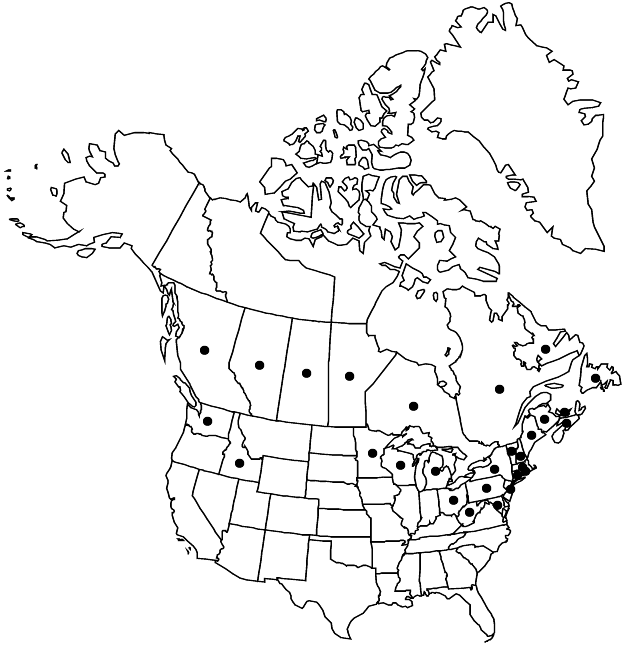Difference between revisions of "Gaultheria hispidula"
Fl. Boston. ed. 2, 165. 1824 ,.
FNA>Volume Importer |
imported>Volume Importer |
||
| (6 intermediate revisions by 2 users not shown) | |||
| Line 7: | Line 7: | ||
}} | }} | ||
|common_names=Creeping snowberry;cancer wintergreen | |common_names=Creeping snowberry;cancer wintergreen | ||
| − | |basionyms={{Treatment/ID/ | + | |special_status={{Treatment/ID/Special_status |
| + | |code=E | ||
| + | |label=Endemic | ||
| + | }} | ||
| + | |basionyms={{Treatment/ID/Basionym | ||
|name=Vaccinium hispidulum | |name=Vaccinium hispidulum | ||
|authority=Linnaeus | |authority=Linnaeus | ||
| + | |rank=species | ||
| + | |publication_title=Sp. Pl. | ||
| + | |publication_place=1: 352. 1753 | ||
}} | }} | ||
|synonyms={{Treatment/ID/Synonym | |synonyms={{Treatment/ID/Synonym | ||
|name=Chiogenes hispidula | |name=Chiogenes hispidula | ||
|authority=(Linnaeus) Torrey & A. Gray | |authority=(Linnaeus) Torrey & A. Gray | ||
| + | |rank=species | ||
}} | }} | ||
|hierarchy=Ericaceae;Ericaceae subfam. Vaccinioideae;Gaultheria;Gaultheria hispidula | |hierarchy=Ericaceae;Ericaceae subfam. Vaccinioideae;Gaultheria;Gaultheria hispidula | ||
| Line 37: | Line 45: | ||
-->{{#Taxon: | -->{{#Taxon: | ||
name=Gaultheria hispidula | name=Gaultheria hispidula | ||
| − | |||
|authority=(Linnaeus) Muhlenberg ex Bigelow | |authority=(Linnaeus) Muhlenberg ex Bigelow | ||
|rank=species | |rank=species | ||
| Line 51: | Line 58: | ||
|publication title=Fl. Boston. ed. | |publication title=Fl. Boston. ed. | ||
|publication year= | |publication year= | ||
| − | |special status= | + | |special status=Endemic |
| − | |source xml=https:// | + | |source xml=https://bitbucket.org/aafc-mbb/fna-data-curation/src/2e0870ddd59836b60bcf96646a41e87ea5a5943a/coarse_grained_fna_xml/V8/V8_1000.xml |
|subfamily=Ericaceae subfam. Vaccinioideae | |subfamily=Ericaceae subfam. Vaccinioideae | ||
|genus=Gaultheria | |genus=Gaultheria | ||
Latest revision as of 22:41, 5 November 2020
Subshrubs (vinelike), creeping, mat-forming, stoloniferous; roots adventitious or fibrous. Stems repent, 10–14 cm, densely strigose. Leaf blades elliptic to oval, 0.3–1 cm, base cuneate to rounded, margins ciliate, (slightly revolute), apex acute, abaxial surface strigose, adaxial glabrous. Inflorescences axillary, solitary flowers; bracts light green, broadly lanceolate, 1.5–2 mm, exceeding sepals, sparsely strigose. Pedicels light green, 1.5–3 mm, strigose; bracteoles absent. Flowers: sepals 4, connate ca. 1/2 their lengths, white, ovate, 1–1.5 mm, hairy basally (hairs dark red); petals 4, connate 1/3 their lengths, white, 2–3.5 mm, glabrous, corolla campanulate, lobes 1.5–2 mm; filaments broadest in middle and narrowing distally and proximally, glabrous; anthers with 2 bifurcating awns, dehiscent by subterminal pores. Fruits white, 2.5–6 mm wide. 2n = 22.
Phenology: Flowering Jun-early Aug; fruiting Jul–Sep.
Habitat: Sphagnum bogs, fens and mossy, coniferous woodland forests and swamps, often on moss-covered or rotting logs
Elevation: 30-1400 m
Distribution

Alta., B.C., Man., N.B., Nfld. and Labr., N.S., Ont., P.E.I., Que., Sask., Conn., Idaho, Maine, Md., Mass., Mich., Minn., N.H., N.J., N.Y., Ohio, Pa., R.I., Vt., Wash., W.Va., Wis.
Discussion
Selected References
None.